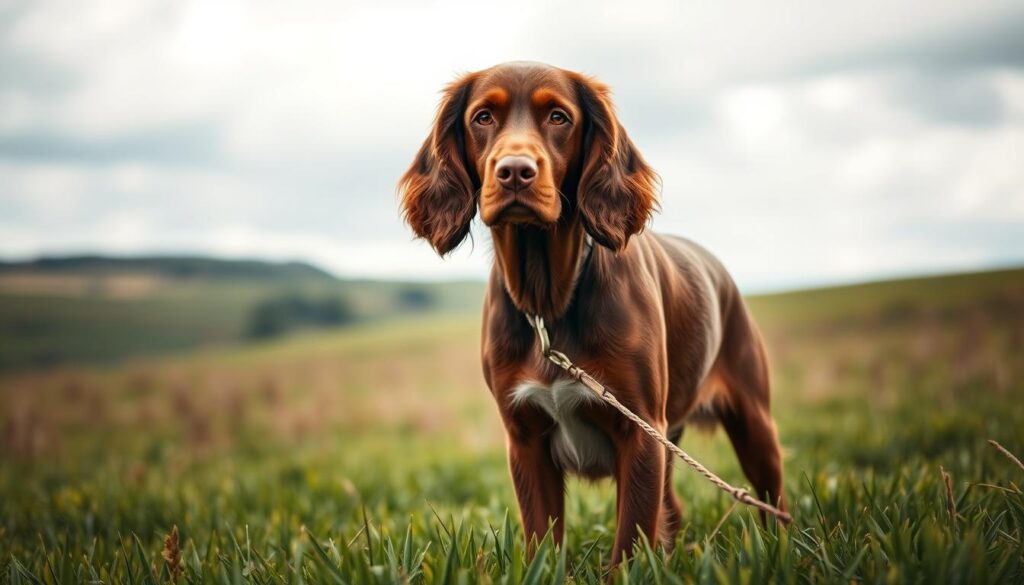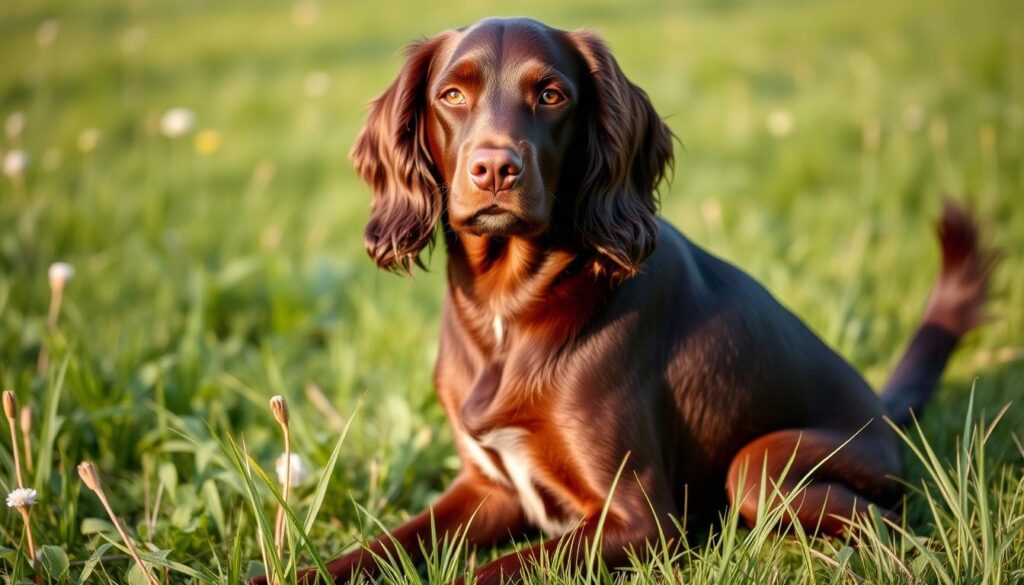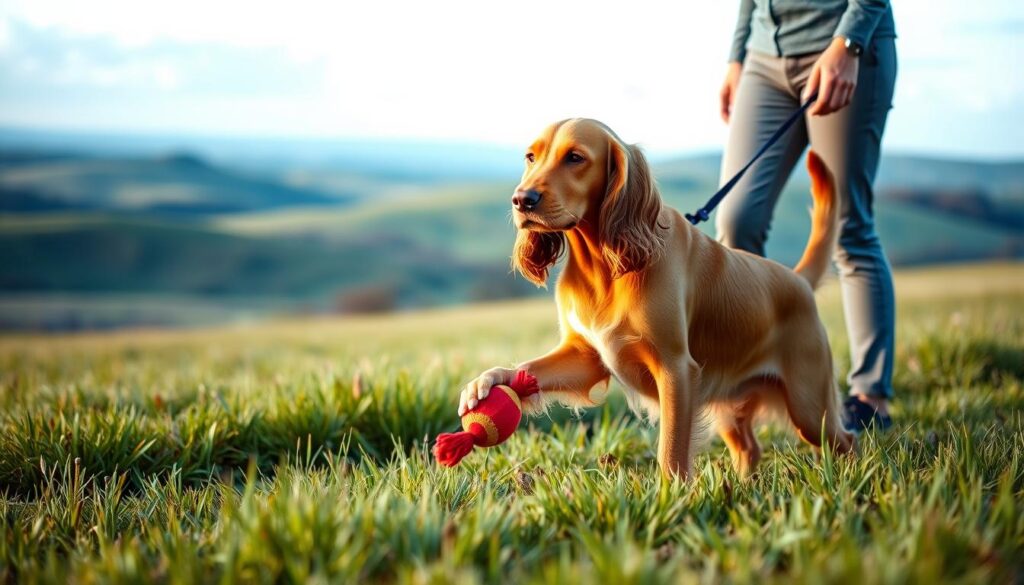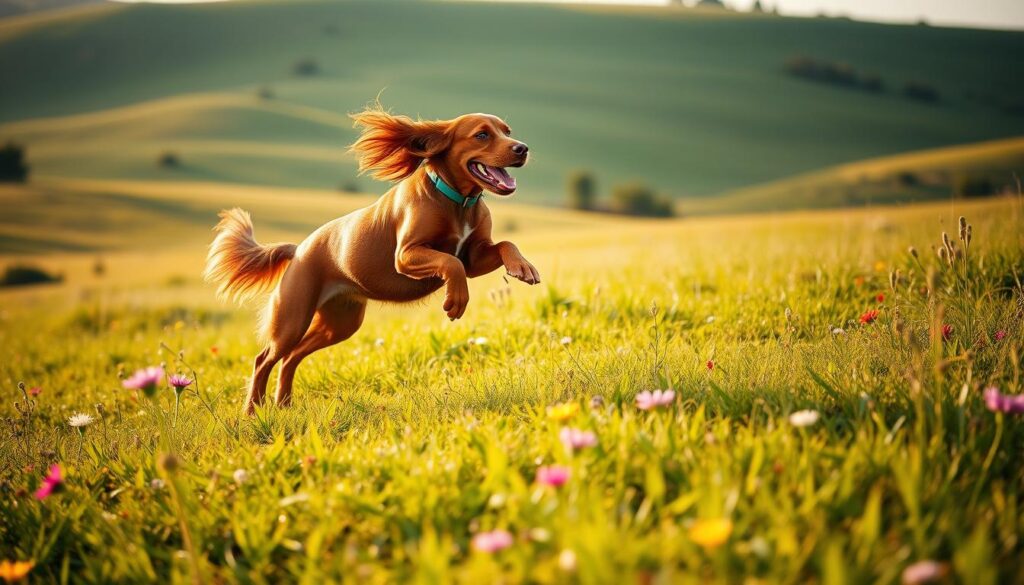Imagine a dog that greets you at the door with a wagging tail. They’re eager to share your day but calm enough to curl by your side. This is the field spaniel—a breed where heart meets purpose.
Known for their devoted nature, these dogs form deep bonds with their families. They offer unwavering loyalty. Their gentle eyes and playful spirit make them more than pets; they become cherished companions.
Recognized by the AKC, field spaniels blend athleticism with affection. Whether trailing through a forest or napping on a living room rug, they adapt seamlessly. Their intelligence shines in both outdoor adventures and quiet moments at home.
For those seeking a dog that balances energy with tenderness, this breed’s unique charm offers a lifetime of connection.
Field Spaniel
The spaniel breed known as the Field Spaniel is a perfect blend of beauty and function. It comes from 19th-century Britain and is known for its hunting skills and loving nature. With a sleek coat and graceful walk, they shine in shows and as family pets.
Overview of the Breed
The Field Spaniel was made for hunting, with a strong yet lean body. Their coat, which can be liver or roan, needs regular care. They have:
- Height: 17–18 inches at shoulder
- Weight: 40–55 pounds
- Lifespan: 12–14 years
| Breed Comparison | Field Spaniel | Cocker Spaniel | Springer Spaniel |
|---|---|---|---|
| Size | Moderate frame | Smaller build | Larger stature |
| Energy Level | High, but balanced | High | Very high |
| Temperament | Steady and loyal | Versatile | Energetic |
Key Qualities and Appeal
This spaniel breed loves to stay active. They are smart and can learn many things, like agility or obedience. They are very social and love being part of the family.
They are easy to adapt to different situations, whether it’s hunting or just relaxing at home. Their balanced energy and low shedding make them a great pet for many homes.
History and Origins of Spaniels
Spaniels have their roots in 16th-century Europe. They were valued as sporting dog friends. These dogs helped hunters by chasing game birds from thick bushes.
Their name might come from the Spanish word “espagnol.” This shows their link to Iberian hunting ways.

Early Beginnings
In the 1500s, spaniels were known as small, quick dogs for hunting waterfowl. Their webbed feet and water-resistant coats were perfect for marshes. By the 1800s, they were bred to track scents and retrieve better, making them key sporting dog friends.
Development Over Time
The Victorian era changed things a lot. Dog shows became popular, and looks became more important than skills. This led to the 1890s when spaniel types were split, making the Field Spaniel its own breed. Today, they mix their hunting past with looks.
| Era | Purpose | Key Traits |
|---|---|---|
| 16th Century | Hunting companion | Water resistance, bird flushing |
| 19th Century | Show competitions | Refined appearance, conformation focus |
| Modern Era | Sporting and companionship | Adaptability, loyalty |
Today’s Field Spaniels keep their sporting dog spirit alive. They also make great family pets. Their journey shows how they’ve kept a balance of usefulness and beauty over the years.
Physical Characteristics and Breed Standards
Field Spaniels are medium-sized dogs with a balanced, muscular build. According to the American Kennel Club (AKC), males are 18 inches tall at the shoulder and weigh 40–50 pounds. Their bodies are slightly longer than tall, showing agility and endurance.
| Category | Standard Detail |
|---|---|
| Coat | Flat, dense double coat with a sleek, glossy appearance. Colors include black, liver, roan, or roan and tan. |
| Head | Distinctive long, low-set ears with a refined skull and moderate stop. |
| Body | Strong, compact frame with a deep chest and muscular hindquarters. |
Coat maintenance is key. Regular brushing prevents matting. A bi-weekly brushing removes dead hair. Professional grooming every 6–8 weeks keeps the coat shiny. Bathing should be minimal to keep natural oils intact.
Health is important. Watch their weight to avoid joint strain. Their sturdy build needs a diet that matches their activity level. The AKC standards focus on traits like straight legs and a level topline. This ensures their physical traits match their working heritage.
Temperament and Behavior
Field Spaniels have unique spaniel characteristics shaped by centuries of being companions and workers. They are calm yet curious, making them perfect for active homes. This mix of traits makes them both trustworthy and fun to be around.

Understanding Their Personality
These dogs love being close to people. Their spaniel characteristics show a strong need to please, which helps them learn quickly. They enjoy activities that challenge their minds and bodies.
For example, they love playing fetch but also enjoy quiet nights at home. This shows their adaptable nature.
- Affectionate yet observant: They bond deeply with family but may seem shy around others.
- Intelligent and adaptable: They pick up commands fast but need regular practice.
- Energy levels vary: They are calm inside but love to explore outside.
Key Behavioral Traits
Field Spaniels are cautious around strangers, a trait from their working past. This caution, combined with their loyalty, makes them good protectors without being aggressive. They don’t like being alone for long.
They are good at solving problems during training. Their eagerness to learn comes from their history as working dogs. This makes training a positive experience for both the dog and the handler.
Training and Socialization Tips
Field Spaniels thrive with consistent guidance. They become well-mannered companions through proper training and socialization. Positive reinforcement strengthens your bond and shapes their behavior.

Effective Training Methods
Consistent techniques build reliable habits. Start with short sessions on key commands:
- Use treats or praise to reward correct actions immediately.
- Repeat commands like “sit” or “stay” in varied settings to reinforce learning.
- End sessions on positive notes to encourage eagerness to learn.
| Method | Outcome |
|---|---|
| Positive Reinforcement | Encourages repeatable behaviors |
| Consistent Commands | Reduces confusion during training |
Socialization Strategies
Early exposure helps Field Spaniels adapt to new experiences. Focus on these strategies:
- Introduce puppies to calm environments like parks or pet stores.
- Gradually introduce sounds like vacuum cleaners or traffic noises.
- Arrange supervised meetups with vaccinated dogs to foster friendly interactions.
Consistent efforts ensure a balanced, confident adult dog. Start early and maintain routines for lasting results.
Field Spaniel in Family Life
Field Spaniels make great family pets. They have lots of energy but also know how to relax. They fit well in many homes, but they need to exercise and play every day. Their friendly nature makes them perfect for families with kids.

Adapting to Home Environments
These dogs can adjust to different homes. But, they need some special care:
- Space: They like yards but can live in apartments if they get walks
- Exercise: They need daily walks or playtime
- Social Needs: They need to be around people a lot to be happy
Companionship and Family Dynamics
Field Spaniels bond strongly with their families. They are protective but also very gentle. They love to join in on family fun and activities.
- Protective instincts around kids
- Enjoy participating in family outings and routines
- Require companionship to avoid loneliness
Field Spaniel and Sporting Activities
Field Spaniels love being active and enjoy outdoor activities. They were bred to hunt and retrieve, so they have a strong work ethic. Their history shows they were great at flushing birds and working in fields, thanks to their agility and stamina.

Performance in Sports
Today, Field Spaniels do well in sports like agility and field trials. They can keep up with high-energy activities and track well. Hunters like them for finding and bringing back game, skills they’ve developed over time.
Outdoor Training Benefits
Field Spaniels need regular exercise to burn off their energy. This helps them stay calm and strengthens their bond with their owners. The benefits include:
- Improved obedience through focused tasks
- Reduced behavioral issues from pent-up energy
- Stronger muscle tone and cardiovascular health
Activities like hiking or swimming are perfect for them. They meet their instincts and keep them happy and healthy.
Health and Nutrition Guidelines
Keeping a Field Spaniel healthy means watching what they eat and their overall care. A good diet helps them stay active and prevents weight problems. Choose high-quality dog food with lots of protein and don’t overfeed to avoid obesity.
Regular exercise and the right food can help prevent joint issues. Field Spaniels often get hip and elbow dysplasia. So, it’s smart to use joint supplements and control their activity. Make sure to take them to the vet once a year to check on their joints and overall health.
- Dietary Focus: Focus on proteins, avoid fillers, and adjust food amounts based on how active they are.
- Preventive Measures: Regular vet visits and genetic tests can catch hereditary problems early.
- Weight Management: Keep an eye on their weight to make sure they stay active without being too heavy.

Get advice from vets on the best foods and how much to feed. Don’t give them human food and choose diets made for active dogs. Taking care of them ahead of time helps them do well in sports and as family pets.
Grooming and Maintenance Requirements
Maintaining the field spaniel temperament starts with consistent grooming routines. A well-kept coat and healthy body help this breed stay active and sociable. These traits are key to their nature.
Coat Care Tips
Regular upkeep keeps their dense coat in top condition:
- Brush 2-3 times weekly to remove loose hair and prevent tangles.
- Bathe every 4-6 weeks to avoid skin dryness.
- Trim ear hair monthly to reduce infection risks.
| Task | Frequency |
|---|---|
| Brushing | Weekly |
| Bathing | Every 4-6 weeks |
| Ear Cleaning | Monthly |
Regular Veterinary Check-Ups
Annual exams ensure early detection of health issues affecting the breed’s vitality. Key points include:
- Yearly vet visits for heart, joint, and eye screenings.
- Dental checks every 6 months to prevent gum disease.
- Genetic testing for conditions like hip dysplasia.
A balanced grooming and health routine supports the field spaniel’s friendly, energetic demeanor. It ensures they stay a joyful companion.
Conclusion
Field Spaniels are loving and full of energy, perfect for active homes. They are smart and easy to train, great for sports or agility. Their gentle side makes them perfect for families.
It’s important to keep them active every day. This keeps them happy and well-behaved. They also need regular grooming and health checks to keep their coat looking good.
Field Spaniels need mental challenges too. They do well with families who love outdoor activities and have a routine. They love to play and need consistent care to thrive.
If you’re ready to give them the time and space they need, they’ll be your best friend. They’re great for families who love to be active and responsible. They’re loyal and full of energy, making them a wonderful choice.
FAQ
What is the personality of the Field Spaniel like?
Field Spaniels are known for being gentle and affectionate. They are playful and make great companions for families and individuals. They have a calm nature but can also be very lively.
How does the Field Spaniel perform in sporting activities?
Field Spaniels are great at field work and hunting. They have lots of energy and are very smart. They need regular outdoor activities to stay healthy and happy.
What are the grooming needs for a Field Spaniel?
Field Spaniels need regular grooming. This includes brushing them weekly and bathing them sometimes. They also need to see the vet regularly to stay healthy.
What training methods work best for the Field Spaniel?
Positive reinforcement and consistent commands work well for Field Spaniels. It’s important to socialize them early. This helps them adjust well to different situations.
How does the Field Spaniel adapt to family life?
Field Spaniels fit well into family life. They are loyal and protective, which is great for children. They need regular exercise, social time, and space to be happy at home.
What health concerns should I be aware of with a Field Spaniel?
Field Spaniels can have hip and elbow dysplasia. Keeping them at a healthy weight is important. Regular vet visits help ensure they stay well for a long time.


